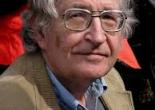Vox Populi
A curated webspace for Poetry, Politics, and Nature. Over 18,800 daily subscribers. Over 7,000 archived posts.
Noam Chomsky: On the Love of Teaching
We certainly want people, both faculty and students, to be engaged in activity that’s satisfying, enjoyable, challenging, exciting–and I don’t really think that’s hard. Even young children are creative, inquisitive, they want to know things, they want to understand things, and unless that’s beaten out of your head it stays with you the rest of your life. If you have opportunities to pursue those commitments and concerns, it’s one of the most satisfying things in life.
That’s true if you’re a research physicist, it’s true if you’re a carpenter; you’re trying to create something of value and deal with a difficult problem and solve it. I think that’s what makes work the kind of thing you want to do; you do it even if you don’t have to do it. In a reasonably functioning university, you find people working all the time because they love it; that’s what they want to do; they’re given the opportunity, they have the resources, they’re encouraged to be free and independent and creative-what’s better? That’s what they love to do. And that, again, can be done at any level.
It’s worth thinking about some of the imaginative and creative educational programs that are being developed at different levels. So, for example, somebody just described to me the other day a program they’re using in high schools, a science program where the students are asked an interesting question: “How can a mosquito fly in the rain?”
That’s a hard question when you think about it. If something hit a human being with the force of a raindrop hitting a mosquito it would absolutely flatten them immediately. So how come the mosquito isn’t crushed instantly? And how can the mosquito keep flying? If you pursue that question — and it’s a pretty hard question — you get into questions of mathematics, physics, and biology, questions that are challenging enough that you want to find an answer to them.
That’s what education should be like at every level, all the way down to kindergarten, literally. There are kindergarten programs in which, say, each child is given a collection of little items: pebbles, shells, seeds, and things like that. Then the class is given the task of finding out which ones are the seeds. It begins with what they call a “scientific conference”: the kids talk to each other and they try to figure out which ones are seeds. And of course, there’s some teacher guidance, but the idea is to have the children think it through.
After a while, they try various experiments and they figure out which ones are the seeds. At that point, each child is given a magnifying glass and, with the teacher’s help, cracks a seed and looks inside and finds the embryo that makes the seed grow. These children learn something-really, not only something about seeds and what makes things grow; but also about how to discover. They’re learning the joy of discovery and creation, and that’s what carries you on independently, outside the classroom, outside the course.
The same goes for all education up through graduate school. In a reasonable graduate seminar, you don’t expect students to copy it down and repeat whatever you say; you expect them to tell you when you’re wrong or to come up with new ideas, to challenge, to pursue some direction that hadn’t been thought of before. That’s what real education is at every level, and that’s what ought to be encouraged. That ought to be the purpose of education. It’s not to pour information into somebody’s head which will then leak out but to enable them to become creative, independent people who can find excitement in discovery and creation and creativity at whatever level or in whatever domain their interests carry them.
— by Noam Chomsky
This is an extended quotation from an edited transcript (prepared by Robin J. Sowards) of remarks given by Noam Chomsky in February, 2014 to a gathering of members and allies of the Adjunct Faculty Association of the United Steelworkers in Pittsburgh, Pennsylvania.
To read Noam Chomsky’s complete remarks published in Jacobin, click here.


Reblogged this on Paradise Lost by author Mollie Bach (Lord) and commented:
Chomsky is the ultimate communicator. His wisdom travels across so many various terrains.
LikeLike
Chomsky never fails to amaze me with his extraordinary wisdom.He can travel from one subject to another almost without effort or so it would seem . His intellect is seamless.
LikeLike
I just shared this by reblogging. Noam Chomsky is amazing, dedicated, and wise on so many levels. He has expressed so eloquently what is also my own philosophy of teaching, a profession I have loved.
LikeLike
Reblogged this on Sara Sally Davis and commented:
This just about sums up my own philosophy of teaching. I’m grateful he can express it so eloquently.
LikeLike
Talking about love of learning, I’m doing an on-line course on Modern American Poetry – hosted by Pennsylvania Uni called Mod Penn. It is brilliant, highly recommended. Coursera is the org which has hundreds of free courses!
LikeLike